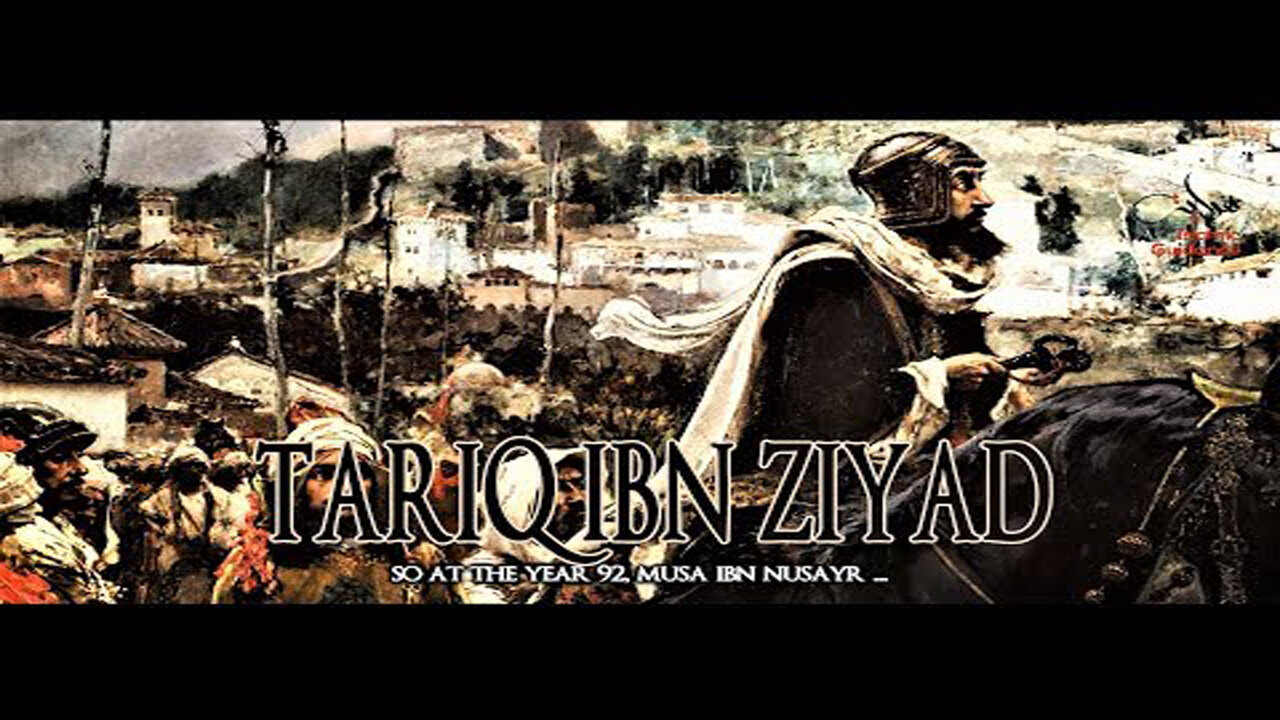Premium Only Content

Tariq bin Ziyad The Conqueror of Iberia
Tariq bin Ziyad The Conqueror of Iberia
In the annals of history, there are figures whose deeds resonate through time, inspiring generations to come. One such figure is Tariq bin Ziyad, a brilliant military strategist, and leader who played a pivotal role in the Islamic conquest of the Iberian Peninsula. His story is a testament to courage, determination, and the pursuit of a vision that changed the course of history.
Tariq bin Ziyad was born in the 7th century in North Africa, during a period of rapid expansion of the Islamic empire. A Berber by birth, he grew up in an environment shaped by diverse cultures, languages, and religious beliefs. From an early age, Tariq displayed exceptional leadership qualities and a thirst for knowledge that would eventually lead him to the forefront of history.
The opportunity for Tariq's rise came when he was appointed by the Umayyad Caliphate to lead an expedition into the Iberian Peninsula, known as Al-Andalus. The year was 711 AD, and the Visigothic rulers held sway over the region. Tariq was tasked with advancing the Islamic empire's reach and establishing a foothold in Europe.
Tariq's strategy was a masterclass in military tactics. He gathered a diverse army, comprising Arab and Berber soldiers, united by their faith in Islam and their loyalty to their leader. Crossing the Strait of Gibraltar, Tariq ordered his men to burn their own ships, effectively eliminating the option of retreat. This bold move sent a clear message: they were committed to victory or death.
As Tariq's forces marched into Al-Andalus, they faced resistance from the Visigothic armies. Tariq's leadership and battlefield acumen quickly became apparent. He utilized his knowledge of the terrain, employing hit-and-run tactics, ambushes, and surprise attacks to undermine the larger and better-equipped enemy forces. Tariq's charisma and strategic brilliance inspired his soldiers, turning a disparate group into a cohesive and determined fighting force.
One of the most decisive moments came at the Battle of Guadalete. Tariq's forces clashed with the Visigothic army led by King Roderic. In the heat of battle, Tariq's tactical prowess shone. He positioned his troops strategically, exploiting the terrain to his advantage. Through a combination of military ingenuity and unwavering resolve, Tariq's forces emerged victorious, despite being outnumbered.
The fall of King Roderic's forces marked a turning point in the history of the Iberian Peninsula. Tariq bin Ziyad's conquests paved the way for the establishment of the Umayyad Caliphate's rule over Al-Andalus. His leadership, marked by fairness and respect for the diverse populations under his rule, garnered the support and admiration of the local populace.
Tariq's legacy extended beyond the battlefield. He recognized the importance of coexistence and cultural exchange. Under his rule, Muslims, Christians, and Jews coexisted harmoniously, contributing to a rich and diverse society that fostered intellectual growth and artistic expression. The city of Cordoba, in particular, flourished as a center of learning and innovation.
Tariq bin Ziyad's life demonstrates the transformative power of determination and strategic thinking. His conquests forever altered the geopolitical landscape of the Iberian Peninsula, leaving an indelible mark on history. Beyond his military achievements, Tariq's legacy serves as a reminder of the potential for leadership to inspire unity, foster understanding, and create a lasting legacy of progress.
In the annals of time, Tariq bin Ziyad's story continues to resonate as a beacon of courage and vision. His journey, from a Berber youth in North Africa to the conqueror of Al-Andalus, encapsulates the essence of human potential – the ability to transcend circumstances and shape history through unwavering determination, strategic brilliance, and a commitment to a higher purpose.
-
 8:03
8:03
MattMorseTV
15 hours ago $5.91 earnedThings in the UK just got INSANE...
66.8K108 -
 3:02:10
3:02:10
daniellesmithab
10 hours agoAlberta Next: Fort McMurray Town Hall
9.59K1 -
 2:11:17
2:11:17
Side Scrollers Podcast
19 hours agoINSANE Illegal Migrant Propaganda Xbox Game + Paypal REFUSES To Pay Dev + More | Side Scrollers
56.8K3 -
 20:58
20:58
GritsGG
1 day agoProtect the President Challenge on Warzone!
12.9K -
 1:49:07
1:49:07
The Michelle Moore Show
2 days ago'Biden's Immigration Mess, President's Trump Spiritual Cry For Help, English Speaking Truckers Only, Woke CEO's Killing of Conservative Brands, Palantir's Kill Chain' Mark Taylor: The Michelle Moore Show (Aug 25, 2025)
34K94 -
 LIVE
LIVE
Lofi Girl
2 years agoSynthwave Radio 🌌 - beats to chill/game to
205 watching -
 2:14:18
2:14:18
The Pascal Show
14 hours ago $0.64 earnedTHEY LIED TO POLICE AGAIN? Jake & Rebecca Haro Have Lost Their Minds! Emmanuel Haro Search Continues
8.48K -
 1:25:52
1:25:52
TruthStream with Joe and Scott
2 days agoSG Sits Down w/ LT From "And We Know": An 80K FT View of Humanity's Great Awakening from 8/22/2025
20.9K16 -
 15:54
15:54
Lacey Mae ASMR
12 hours ago $0.88 earnedASMR For Sleep in 15 Minutes!
13.1K10 -
 3:16:38
3:16:38
Price of Reason
13 hours agoTrump FIRES Fed Governor Lisa Cook! Cracker Barrel CRISIS Continues! James Gunn DCU Woes! Gamescon!
116K8